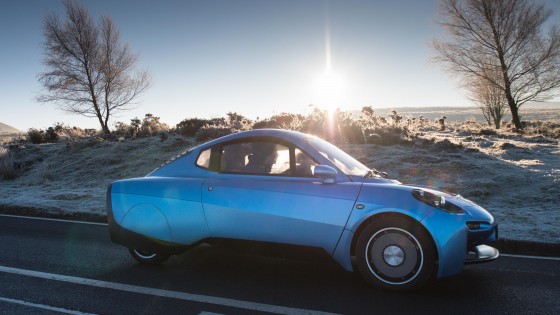
Welsh startup unveils ultra-lightweight hydrogen fuel cell car
by Cleantech Canada Staff

Riversimple two-seater weighs in at just 580 kg, but can reach highway speeds and has a range of nearly 500 km

The cleantech startup’s Rasa was helped off the ground by a two million pound loan from the Welsh government. PHOTO Riversimple
LLANDRINDOD WELLS, U.K.—An automotive startup headquartered in the Welsh countryside outside of Swansea, U.K. has revealed a hydrogen fuel cell vehicle that’s light on its wheelbase and the environment.
Weighing in at just 580 kilograms—little more than the world’s top dead-lifters can snatch off the ground—Riversimple’s Rasa packs impressive punch for a small package.
“We really have started from a clean sheet of paper,” Hugo Spowers, the company’s founder, said. “The Rasa gives us the opportunity to introduce customers to a more convenient concept of motoring, a lightness of ownership that neither places a burden on the pockets of motorists or the surrounding environment. The car is simple, light and fun in every respect.”

The automaker plans to sell the car as a service, charging customers a monthly fee package but maintaining ownership itself, as opposed to selling the vehicles outright. PHOTO: Riversimple
With the street-legal production prototype now touring roads across the U.K., the company is looking to take its next step toward truly developing its manufacturing base. It received a two million pound grant from the Welsh government last year, and plans to raise more funds in order to launch a 20-vehicle beta test later this year.
The prototype has clocked in at speeds of more than 100 kilometres per hour, and sports a nearly 500-kilometre range. Powered by a 8.5 kilowatt hydrogen fuel cell, which is the current size for most forklift trucks, the Rasa has zero tailpipe emissions—like other hydrogen models, emissions are a result of how cleanly the fuel is produced. The two-seater has four electric motors—one for each wheel and uses dynamic braking, which lets it recover more than half of its kinetic energy when coming to a stop. The vehicle’s light, carbon fibre design also allows it to travel farther while using less energy.
“It’s the synthesis of all these technologies that delivers the groundbreaking efficiency and range, many times better than inserting fuel cells into conventional, heavy, vehicles,” the company said.
Once it reaches production, unlike most conventional automakers, the company is planning to employ a sale of service ownership model. Instead of selling the cars, Riversimple will charge customers a monthly fee to keep a Rasa in their driveway. The company maintains ownership, and will take care of repair, maintenance, insurance and fuel expenses.
If all goes well with its upcoming beta test, Riversimple hopes to have a production model on the market by 2018.
While hydrogen infrastructure is still non-existent in most parts of the world, the U.K. is one region that’s pursuing hydrogen transportation in earnest—another being Japan. The U.K government pledged 11 million pounds toward developing hydrogen fuel stations in 2014, and cleantech firms are also working on the technology. Energy storage company ITM Power for instance, launched a wind-powered hydrogen fuel station last year.